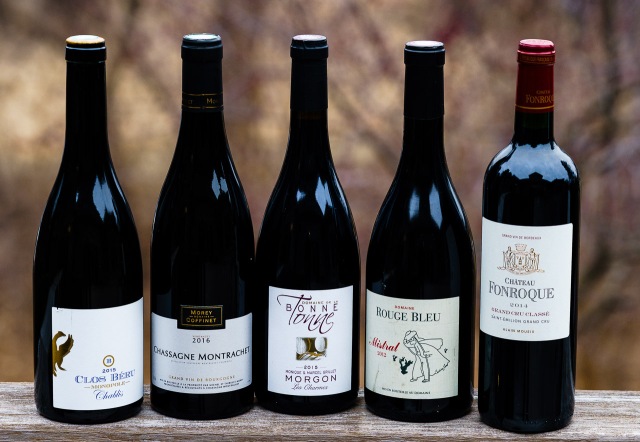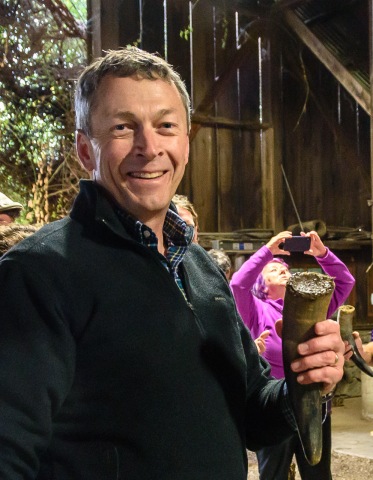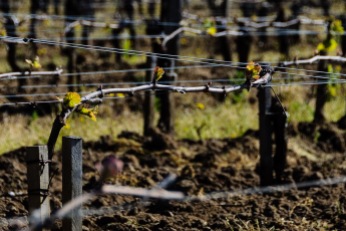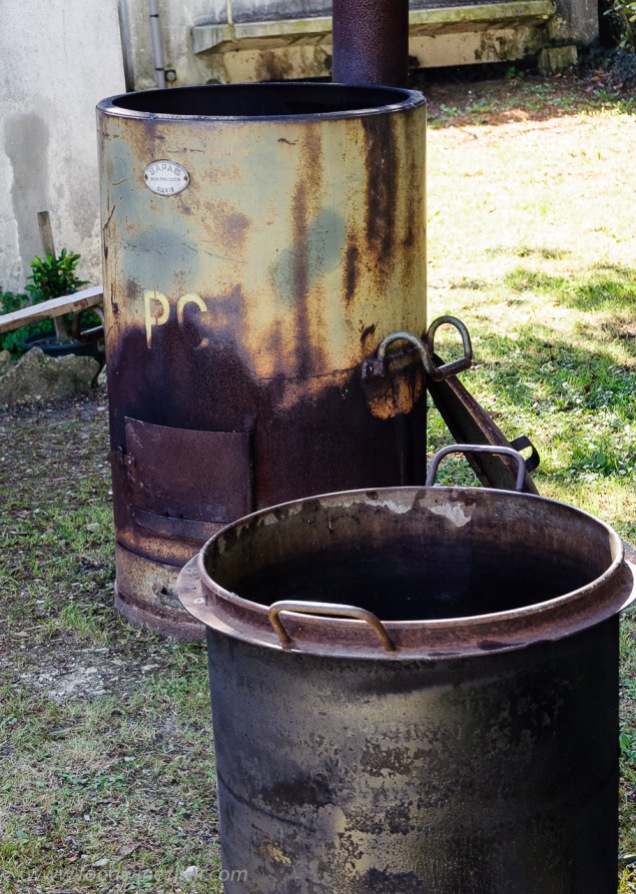Our Biodynamic French Friends #Winophiles

Biodynamic wines from all over France
Biodynamics Isn’t for Everyone
It’s January 2019, and our French Winophiles group is exploring biodynamics in France. I’ve been interested in the viticulture side of wine for some time, and I’ve been writing about it a bit recently. I explained why I’m interested in a post (here) if you’re interested.
There’s a lot of hoopla about some of the more unusual aspects of biodynamics: manure filled cow horns, working by moon phases, root days. If you step back though and take a larger view, it makes more sense. Biodynamics treats the farm as an ecosystem. The idea is to promote and encourage the health of all aspects of the farm: the soil, the crops, animals, and farmers. Sounds great, why isn’t everyone practicing biodynamics? Two words: Powdery Mildew.
The reality of biodynamic viticulture is that it’s more work and higher risk. Significantly more labor is required per acre of farm, so labor costs are higher. Contrary to popular belief, chemical use isn’t forbidden, it’s simply limited to traditional chemicals involving copper sulfate and sulfur. Unfortunately, these chemicals are less effective compared to modern counterparts, and copper in particular tends to collect in the soil over time. Finally, in climates where rain and hail are a risk during the growing season, powdery mildew is a big risk for grapes. Winegrowers can lose an entire vintage to powdery mildew with a single ill-timed rainstorm. Well timed application of the approved copper sulfate (Bordeaux mixture) can manage the fungus, but it is higher risk.
For biodynamic winegrowers, the payoff of better wines outweighs the risks and additional labor required. Biodynamics extends into the techniques used in the cellar, where chemical adjustments are also not allowed. If you want the wine in your glass to have the best chance to show where it comes from, and something about the vintage, you might want to try some biodynamic wines.
Real Risks to Organic and Biodynamic Viticulture
(click on any photo to start a full size slide show, hit “escape” to return to the post)
In multiple trips to France, we have sought out, or lucked into visits with passionate practitioners of biodynamics. Here then, are some French biodynamic wineries we have visited and think of as our friends
Château de Béru in Chablis
We visited Chablis and Château de Béru in the summer of 2018. Here’s a link to my post detailing our visit. Our guide Gaelle shared a touching story with us. They lost the entire 2016 vintage to a combination of early frost and powdery mildew during the summer. Other organic and biodynamic winegrowers in France heard of their situation and sent grapes from their vineyards so they could make wine in 2016. Their fellow winegrowers said that perhaps they would repay the kindness if they ever fell to the same fate. That’s comraderie!
If you are planning to visit Chablis, definitely schedule a visit at Château de Béru. You might even decide to stay at their B & B. I think we will do so on a future visit!
Domaine Rouge-Bleu in Cairanne in the Southern Rhone
We visited the Southern Rhone back in spring 2014. We stayed in the lovely bed and breakfast at Domaine Rouge-Bleu. An idyllic setting among the vines, we highly recommend you visit and stay! Link here for more details of our visit.
Chateau Fonroque in Saint Emilion
Bordeaux must be one of the most challenging environments for organic and biodynamic viticulture. The climate is maritime, with rain possible all year long, along with threats of frost and hail. Alan Mouiex was convinced it was possible, and he achieved organic certification in 2006 and biodynamic certification in 2008. I visited Chateau Fonroque in April 2016, I detailed my visit in a post here. Chateau Fonroque remains one of my favorite Bordeaux wines. Classified Saint Emilion Grand Cru Classé, the wines are delicious and remain affordable. As is often the case today, the Chateau changed ownership recently. However, Alan has remained in charge of the winemaking, so hopefully they will stay the course with their approach.
Domaine de la Bonne Tonne in the Morgon Village of Beaujolais
We visited Domaine de la Bonne Tonne in the summer of 2017. Marcel Grillet’s story of transition to organic and biodynamic farming is a fascinating one. Jump to my report from our visit here. Domaine de la Bonne Tonne is a testament to the passion and dedication needed to pursue an organic and biodynamic approach, and it has nothing to do with status or cachet. It’s about the quality of the wines and pride in your product.
Domaine Morey-Coffinet in Chassagne-Montrachet, Bourgogne (Burgundy)
I visited Thibaud Morey at Domaine Morey-Coffinet in the fall of 2016, please see my post here. At the time, Domaine Morey-Coffinet had converted to biodynamic viticulture, but Thibaud shared they were not yet working by the phases of the moon in the cellar.
Looking for Organic and Biodynamic Products
In France, all sorts of natural products carry certification, not just wine. Look for the AB symbol for Agriculture Biologique organic certification. You can look for this symbol on all sorts of agriculture products. It’s super useful when you go to market day! You may also see Ecocert certification, another organic certification.
The best known biodynamic certification is Demeter, and they are active worldwide. There is also Biodyvin, which is an organization of biodynamic winegrowers in Europe.
More Biodynamic Wines from Fellow French #Winophiles
Interested in Biodynamics in France? Join our chat on Saturday morning, Jan. 19 10am CST on Twitter at #Winophiles. We’d love to hear your thoughts!
- Camilla from Culinary Adventures with Camilla whips up “Learning about Biodynamic Wines + M.Chapoutier Wines with Some Cross-Cultural Pairings.”
- Jill from L’OCCASION shares “Lessons From A Biodynamic Winemaker In France”
- Wendy at A Day In The Life On The Farm reminds us about “Eating and Drinking Responsibly”
- Deanna from Asian Test Kitchen tells us how “French Biodynamic Wines get Crabby.”
- Jeff from foodwineclick discusses “Our Biodynamic French Friends”
- Kat from Bacchus Travel & Tours tells us how “The #Winophiles Unlock the Mystery of Biodynamic Wines”
- Jane cooks things up at Always Ravenous and shares “Why You Should Give Biodynamic Wines a Taste.”
- Nicole from Somms Table shares “Somm’s Table: Cooking to the Wine: Marcel Lapierre Morgon with a Hearty White Bean Stew”
- Lynn from Savor the Harvest shares “ Biodynamic Bordeaux- Nobody’s Perfect But The Wine Is Fabulous.”
- Susannah from Avinaire joins us with “Biodynamic Wines Crémant D’Alsace“
- Robin at Crushed Grape Chronicles entices us with “Fabulous French Biodynamic Wines and some exquisite pairings”
- Pinny from Chinese Food and Wine Pairings shares “Detox with Organic French Wine and Cantonese Light Flare”
- Host Gwendolyn on Wine Predator presents “Navarin French Lamb Stew with Organic, Biodynamic M. Chapoutier “Les Meysonniers” and “Still and Sparkling: 2 Biodynamic Wines from Alsace #Winophiles”

Having had lots of pets in our home, a little poop doesn’t scare me off!
Comments
16 Responses to “Our Biodynamic French Friends #Winophiles”Trackbacks
Check out what others are saying...-
[…] Jeff from foodwineclick discusses “Our Biodynamic French Friends” […]
-
[…] Jeff from foodwineclick discusses “Our Biodynamic French Friends” […]
-
[…] Jeff from foodwineclick discusses “Our Biodynamic French Friends” […]
-
[…] Jeff from foodwineclick discusses “Our Biodynamic French Friends” […]
-
[…] Jeff from foodwineclick discusses “Our Biodynamic French Friends” […]
-
[…] biodynamics in Willamette Valley. I’ve written multiple posts on biodynamics (here, here, here), so I’ll spare the details here and jump right into Willamette Valley and Brick House […]






















































I am a fan of biodynamic wines. I don’t get the moon schedule, but the way it works with the soil makes perfect sense to me. Plus, I’ve never had a poor quality biodynamic wine – yet.
I’m always happy to see a “messy” vineyard and biodynamic wines are right up my alley too. Cheers!
Love this — “why isn’t everyone practicing biodynamics? Two words: Powdery Mildew.” HA! And I love that picture of you holding the horn (at Bonterra yes? I was there too!) I had no idea that this was such an interest of yours.
There are always two sides to every story. Thanks for sharing both.
So much behind the scenes knowledge in this post! It sounds like you’ve been a biod fan for awhile. Loved the detailed photos from your visits.
Thoroughly enjoyed your article Jeff. The way you describe biodynamics treating the farm as an ecosystem is similar to how beneficial bacteria works in our guts then body (in a way). Do things to make the system thrive.
The copper sulfate discussion is a big and difficult one, especially in Bordeaux. It will be interesting to see how the EU changes regarding use of it pan out due to the pros and cons. Finally, I haven’t visited Château Fonrogue and really need to!
As a fan of organic food, biodynamic wine is a natural interest and choice for me when purchasing wine. I do look forward to better labeling and selection in stores and restaurants.
I love how you’ve been able to experience biodynamics in several distinct French regions. It’s interesting to discover how conditions imapact (or don’t) the choice to engage in biodynamic practices.
These photos are beautiful! The rain only enhances the textures and colors. Thanks Jeff!
I love all of these winery adventures! I particularly loved the touching story at Château de Béru — that is camraderie indeed!
Stunning photos, wonderful insights, and fabulous stories of biodynamic winemakers. Beautiful piece!